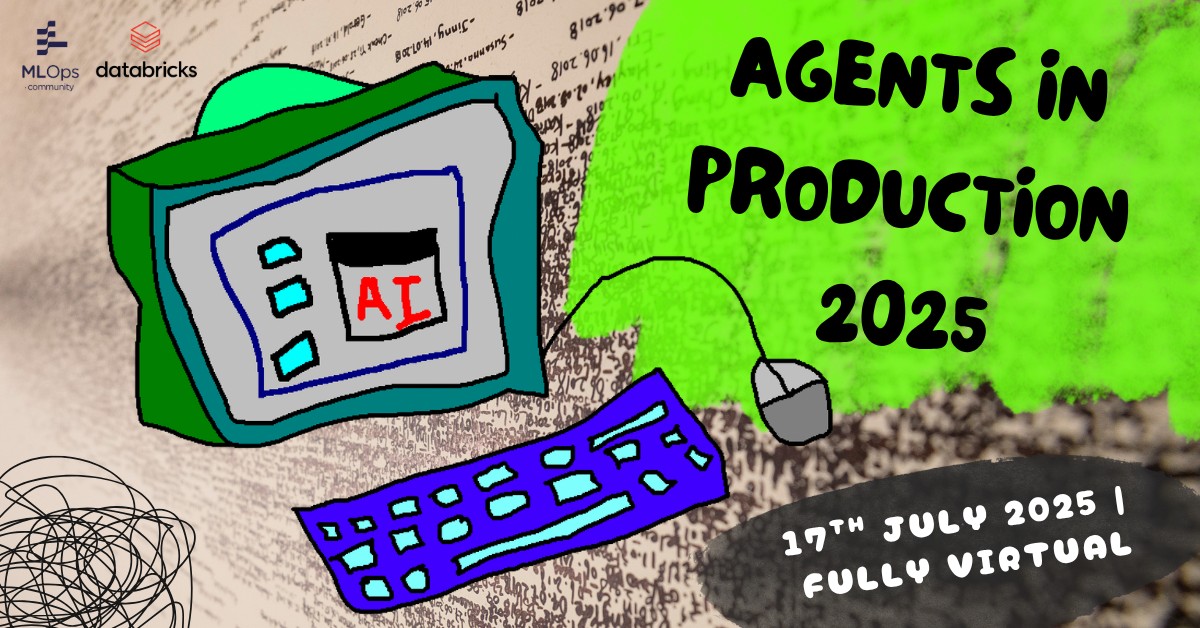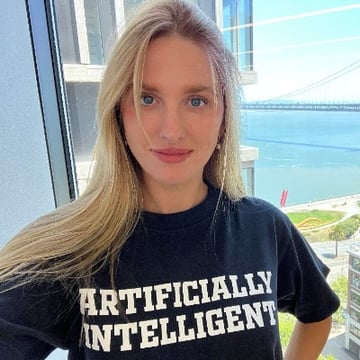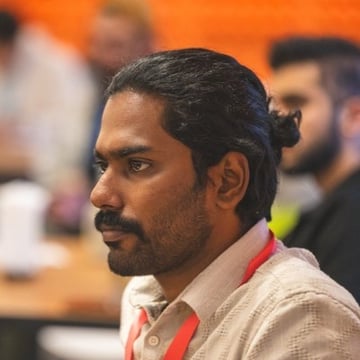

LIVESTREAM
Agents in Production 2025
AI Agents Are Already Working — Let’s Talk About It
Agents are no longer just experiments. From e-commerce to customer support to analytics workflows, they’re quietly getting real work done in production.
On July 17, join the MLOps Community for Part 2 of Agents in Production — a virtual event focused on the messy, practical side of building and deploying AI agents.
What’s on deck?
- Taming complexity: agent memory, behavior control, latency vs. response tradeoffs
- Stories from the field: How companies are actually using agents in live environments
- Tooling that works: routing, evaluation, UX, and cost performance in the wild
It’s free, it’s global, and it’s going to be packed.
Speakers
Dipanwita Mallick
Principal Product Manager @ HP
Philipp Schmid
AI Developer Experience @ Google DeepMind
Shraddha Yeole
Senior Software Engineer, Machine learning @ ThousandEyes part of Cisco
Allegra Guinan
Co-founder @ Lumiera
Yuki Watanabe
Sr. Software Engineer @ Databricks
Madison Kanna
Growth Engineer @ Baseten
Sarah Gebauer
Founder and Physician @ Validara Health
Venkata Gopi Kolla
Lead Software Engineer @ Salesforce Inc
Surendra Narang
Senior Manager Cyber Security @ PaloAlto Networks
Meryem Arik
CEO / Co-founder @ Doubleword
Krista Opsahl-Ong
Research Engineer @ Databricks
Gal Peretz
Head of AI @ Carbyne
Tula Masterman
Principal AI Agent Solutions Architect @ MeshAgent
Lars Maaløe
Co-founder & CTO @ Corti
Mariana Prazeres
AI Engineer @ Run the eval loop
Stephanie Kirmer
Senior Machine Learning Engineer @ DataGrail
Erica Hughberg
Community Advocate @ Tetrate
Annie Condon
AI Solutions Engineer @ Acre Security
Jeff Groom
Director of Engineering, AI @ Acre Security
Maria Zhang
CEO & Co-Founder @ Palona AI
Somya Rai
Principal AI Engineer @ EXL
Aurimas Griciūnas
Founder & CEO @ SwirlAI
Valliappa Lakshmanan
Operating Executive @ N/A
Robert Caulk
C*O @ AskNews
Diego Oppenheimer
Head of Product @ Hyperparam
Shahul Elavakkattil Shereef
Co-founder & CTO @ Ragas
Simba Khadder
Founder & CEO @ Featureform
Nimrod Busany
Founder & Chief Scientist @ Traigent
Patrick Barker
CTO @ Kentauros AI
Edward Upton
Founding Engineer @ Asteroid
Advait Patel
Senior Site Reliability Engineer @ Broadcom
Dexter Horthy
Founder @ HumanLayer
Ben Labaschin
Principal Machine Learning Engineer @ Workhelix
Jonas Scholz
Co-founder @ Sliplane
Vrushank Vyas
Dev Rel / GTM @ Portkey
Shai Rubin
CTO and Co-founder @ Strudel AI
Pierre Gerardi
MLOps Team Lead & Senior Machine Learning Engineer @ Superlinear
Hakan Tek
Full-stack Developer @ Digital Data GmbH
Erik Goron
ML / AI Engineer @ Happyrobot
Devin Stein
Founder & CEO @ Dosu
Adam Sroka
CEO & Co-founder @ Hypercube Consulting
Mohamed Rashad
Co-founder & CTO @ DevisionX
Tanmay Tiwari
Senior Software Full Stack Engineer @ Rivian via BayOne
Ryan Fox-Tyler
Co-founder and SVP Product/Engineering @ Hypermode
Colin McNamara
Co-founder; Managing Partner for Engineering @ Always Cool Brands | Always Cool AI
David de la Iglesia Castro
AI Engineer @ Mozilla.ai
Renato Byrro
Machine Experience Engineer @ Arcade.dev
Brooke Hopkins
Founder @ Coval
Peter Bakkum
Member of Technical Staff, Multimodal API Lead @ Open AI
Demetrios Brinkmann
Chief Happiness Engineer @ MLOps Community
Agenda
Stage 1
Stage 2
Stage 3
From3:40 PM
To3:45 PM
GMT
Tags:
Opening / Closing
Welcome Note
Speakers:

From3:50 PM
To4:15 PM
GMT
Tags:
Keynote
The Future of Compute: How AI Agents Are Reshaping Infrastructure
+ Read More
Speakers:

From4:20 PM
To4:45 PM
GMT
Tags:
Presentation
Beyond Chatbots: How to build Agentic AI systems with Google Gemini
+ Read More
Speakers:

From4:50 PM
To5:00 PM
GMT
Tags:
Lightning Talk
How to Build Execution Layers That Don’t Burn Out
+ Read More
Speakers:

From5:05 PM
To5:30 PM
GMT
Tags:
Presentation
From Guesswork to Greatness: Systematic AI Agent Optimization in Production
+ Read More
Speakers:

From5:35 PM
To6:00 PM
GMT
Tags:
Panel Discussion
Underwriting Assist - A Multi Agent System
+ Read More
Speakers:





From6:05 PM
To6:15 PM
GMT
Tags:
Break
Swag Giveaway
From6:15 PM
To6:40 PM
GMT
Tags:
Presentation
Building Agents for Healthcare
+ Read More
Speakers:

From6:45 PM
To7:10 PM
GMT
Tags:
Presentation
How to Stop AI Agents from Bleeding Your Cloud Budget
+ Read More
Speakers:

From7:15 PM
To7:40 PM
GMT
Tags:
Presentation
Machine Experience Engineering
+ Read More
Speakers:

From7:45 PM
To7:55 PM
GMT
Tags:
Break
Musical Jamz
From7:55 PM
To8:20 PM
GMT
Tags:
Presentation
The Facts Flywheel
+ Read More
Speakers:

From8:25 PM
To8:50 PM
GMT
Tags:
Presentation
Too much lock-in for too little gain: agent frameworks are a dead-end
+ Read More
Speakers:

From8:55 PM
To9:05 PM
GMT
Tags:
Lightning Talk
Evaluating AI Agents: Why It Matters and How We Do It
+ Read More
Speakers:



From9:10 PM
To9:20 PM
GMT
Tags:
Lightning Talk
From Spikes to Stories: AI-Augmented Troubleshooting in the Network Wild
+ Read More
Speakers:

From9:25 PM
To9:35 PM
GMT
Tags:
Break
Meme Showdown
From9:35 PM
To9:45 PM
GMT
Tags:
Lightning Talk
The Hidden Infrastructure Behind Every AI Agent
+ Read More
Speakers:

From9:50 PM
To10:00 PM
GMT
Tags:
Lightning Talk
From Console Scripts to Agentic Services: Building Observability into Everyday LLM Workflows
+ Read More
Speakers:

From10:05 PM
To10:30 PM
GMT
Tags:
Presentation
Driving Evaluation-Driven Development with MLflow 3.0
+ Read More
Speakers:

Event has finished
July 17, 3:30 PM GMT
Online
Event has finished
July 17, 3:30 PM GMT
Online


















































